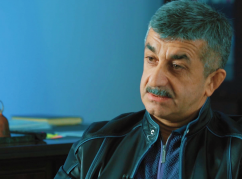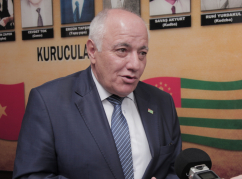The President of Abkhazia Raul Khadzhimba told about the formation of the national idea, the preservation and development of the Abkhaz and Abazin languages, as well as the strengthening of ties with the Diaspora.
Interview by Asta Ardzinba
- What national idea unites today Abkhazians and Abazins?
- The national idea of any nation, big and small, should be an opportunity to preserve itself, to preserve the country it represents. For us this is not an easy task. We are a small people, and our country is not the largest. However, we have passed through millenniums, have reached today and it would be unacceptable to get lost in the future. We need to do everything so that we will survive as a people, as a nation and multiply the available opportunities for the country to be successful. Fortunately, there are a lot of them. Despite the fact that we are a small state, we have resources, our geographical position and readiness to create in order for the country to fulfill its potential.
- Language as a means of communication is an important aspect in the issue of strengthening ties with the Diaspora. What does the state do to preserve the language, both at home and in places where Abkhazians live in compact places?
- The state supports projects and programs that contribute to the qualitative study of the native language and its promotion. The recently created State Committee on Language Policy is concerned with the preservation of the language, placing particular emphasis on the preparation of audio-visual aids for the young audience. We have repeatedly talked about the importance of civil servants speaking more in Abkhazian.
Many of the actions that began right after the war were aimed at making the Abkhazian language available for the Diaspora, in Turkey and in other countries. Everything was done to provide the Diaspora with specialists and relevant educational materials. Today this work also actively continues.
There is another task - the preservation of the Abazin language. It is necessary to create conditions for both the Abkhazian and the Abazin to survive and develop. For this, much is being done to date. And I have no doubt that the activity of the World Abaza Congress and the work of our scientific intelligentsia in this direction will give positive results.
- What, in your opinion, is required for greater strengthening of ties between fraternal peoples?
- A lot has been done in this direction. And today a lot of work is being done. It is aimed at ensuring that the representatives of our brotherly people, the Abazins, can find themselves in Abkhazia, work here.
For our further rapprochement, it is necessary to interact more intensively at the public, state level, at the level of developing and implementing joint economic projects. The World Abaza Congress opens new opportunities for this.
We all should be here, and together we should develop the Abkhazian state. Today it is necessary to do everything to ensure that our compatriots living abroad return and build this state together with us. Without the participation of our brothers, it will be difficult for us.
- Why the process of repatriation is not as active as we would like? What are the main obstacles for it?
- Unfortunately, not everyone is well informed about Abkhazia, although they know that this is their homeland. I am grateful to the Abkhaz cultural centers for their work on informing our compatriots about the Republic of Abkhazia.
It is necessary to create such conditions that would be attractive for our Diaspora. Often we hear from the same Turkey that representatives of our people are leaving for Germany and England for a better life. If this better life is available here, they will come here. We need to work on this.
Nevertheless, the process of repatriation is underway. In particular, several hundred people moved from Syria. Yes, they came here as a result of the war, but, I think, already, having settled down here, they will remain with us. They are fully adapted, most of them are settled.
During the last two or three years we have been actively cooperating with representatives of the Diaspora in Jordan, who are very interested in Abkhazia, are trying to return here. There are certain opportunities that give us confidence that this will have development. The same applies to those representatives of our Diaspora who live in other states.
Today I signed a decree on the transformation of the State Repatriation Committee into the Ministry. Now the status of this agency has become even higher. This is not just a change of name, but a new content that will contribute to the solution of problems and the attainment of the set goals. I have no doubt that this was the right decision. We have talked about this for a long time, and today we have a Ministry for Repatriation.
- How do you assess the role of the Diaspora in the structuring of the Abkhazian state?
- The war showed how much our Diaspora is ready to participate in the structuring of the Abkhaz state. A number of the men, who came to defend their homeland, were killed. They came here for the call of the Motherland. Those who survived and won remained in Abkhazia after the war. Today they are active participants in the construction of the state. Many of them work in the field of repatriation. Their personal example has become contagious for those who are still living outside their historical homeland.


to login or register.